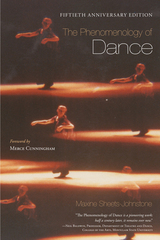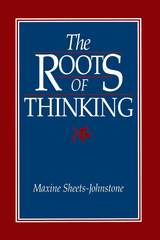2 books about Sheets-Johnstone, Maxine

The Phenomenology of Dance
Maxine Sheets-Johnstone
Temple University Press, 2015
When The Phenomenology of Dance was first published in 1966, Maxine Sheets-Johnstone asked: “When we look at a dance, what do we see?” Her questions, about the nature of our experience of dance and the nature of dance as a formed and performed art, are still provocative and acutely significant today. Sheets-Johnstone considers dance as an aesthetic mode of expression, and integrates theories of dance into philosophical discussions of the nature of movement.
Back in print after nearly 20 years, The Phenomenology of Dance provides an informed approach to teaching dance and to dance education, appreciation, criticism, and choreography. In addition to the foreword by Merce Cunningham from the original edition, and the preface from the second edition, this fiftieth anniversary edition includes an in-depth introduction that critically and constructively addresses present-day scholarship on movement and dance.
Back in print after nearly 20 years, The Phenomenology of Dance provides an informed approach to teaching dance and to dance education, appreciation, criticism, and choreography. In addition to the foreword by Merce Cunningham from the original edition, and the preface from the second edition, this fiftieth anniversary edition includes an in-depth introduction that critically and constructively addresses present-day scholarship on movement and dance.
[more]

The Roots Of Thinking
Maxine Sheets-Johnstone
Temple University Press, 1990
"A significant contribution to the study of early humans, this book is a philosophical anthropology.... it makes genuinely novel, and highly persuasive, claims within the field itself."
--David Depew
In this ground-breaking interdisciplinary study about conceptual origins, Maxine Sheets-Johnstone shows that there is an indissoluble bond between hominid thinking and hominid evolution, a bond cemented by the living body. Her thesis is concretely illustrated in eight paleoanthropological case studies ranging from tool-using/tool-making to counting, sexuality, representation, language, death, and cave art. In each case, evidence is brought forward that shows how thinking is modeled on the body-specifically, how concepts are generated by animate form and the tactile-kinesthetic experience.
Later chapters critically examine key theoretical and methodological issues posed by the thesis, Sheets-Johnstone demonstrates in detail how and why a corporeal turn in philosophy and the human sciences can yield insights no less extraordinary than those produced by the linguistic turn. In confronting the currently popular doctrine of cultural relativism and the classic Western metaphysical dualism of mind and body, she shows how pan-cultural invariants of human bodily life have been discounted and how the body itself has not been given its due. By a precise exposition of how a full-scale hermeneutics and a genetic phenomenology may be carried out with respect to conceptual origins, she shows how methodological issues are successfully resolved.
"Ranging across the humanities and sciences, this thoroughly original book challenges both traditional metaphysics and contemporary cultural relativism. In their place, it persuasively develops a phenomenonological, tactile-kinesthetic account of the origins of thinking. This philosophical anthropology could not be more timely. It replaces the 'linguistic turn' with a promising new 'corporeal turn.'"
--John J. Stuhr, University of Oregon
"This work takes a much-needed stand in the inter-disciplinary field of philosophical anthropology. Sheets-Johnstone is well-read in the history of philosophy and in contemporary anthropology. The point of view she offers is inventive, insightful, well-established, and fruitful."
--Thomas M. Alexander, Southern Illinois University at Carbondale
[more]
READERS
Browse our collection.
PUBLISHERS
See BiblioVault's publisher services.
STUDENT SERVICES
Files for college accessibility offices.
UChicago Accessibility Resources
home | accessibility | search | about | contact us
BiblioVault ® 2001 - 2024
The University of Chicago Press









